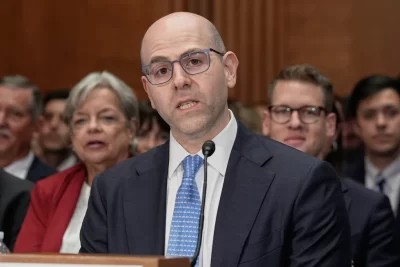
SAN FRANCISCO — “Move fast and break things,” a high-tech mantra popularized 20 years ago by Facebook founder Mark Zuckerberg, was supposed to be a rallying cry for game-changing innovation. It now seems more like an elegy for a society perched on a digital foundation too fragile to withstand a defective software program that was supposed to help protect computers — not crash them.
The worldwide technology meltdown caused by a flawed update installed earlier this month on computers running on Microsoft’s dominant Windows software by cybersecurity specialist CrowdStrike was so serious that some affected businesses such as Delta Air Lines were still recovering from it days later.
It’s a tell-tale moment — one that illustrates the digital pitfalls looming in a culture that takes the magic of technology for granted until it implodes into a horror show that exposes our ignorance and vulnerability.
“We are utterly dependent on systems that we don’t even know exist until they break,” said Paul Saffo, a Silicon Valley forecaster and historian. “We have become a little bit like Blanche DuBois in that scene from ‘A Streetcar Named Desire,’ where she says, ‘I have always depended on the kindness of strangers.’ ”
‘Gum and shoelaces’ and the perils of a connected world
The dependence — and extreme vulnerability — starts with the interconnections that bind our computers, phones and other devices. That usually makes life easier and more convenient, but it also means outages can have more far-reaching ripple effects, whether they are caused by a mistake like the one made by CrowdStrike or through the malicious intent of a hacker.
“It might be time to look at how the internet works and then question why the internet works this way. Because there is a lot of gum and shoelaces holding things together,” said Gregory Falco, an assistant professor of engineering at Cornell University.
The risks are being amplified by the tightening control of a corporate coterie popularly known as “Big Tech”: Microsoft, whose software runs most of the world’s computers; Apple and Google, whose software powers virtually all of the world’s smartphones; Amazon, which oversees data centers responsible for keeping websites running (another key service provided by Microsoft and Google, too, in addition to its e-commerce bazaar); and Meta Platforms, the social networking hub that owns Facebook, Instagram and WhatsApp.
It’s a highly concentrated empire with a few corridors open to a network of smaller companies such as CrowdStrike — a company with $3 billion in annual revenue, a fraction of the nearly $250 billion in annual sales that Microsoft reels in. All of the key players still tend to put a higher priority on the pursuit of profit than a commitment to quality, said Isak Nti Asar, co-director of the cybersecurity and global policy program at Indiana University.
“We have built a cult of innovation, a system that says. ‘Get technology into people’s hands as quick as possible and then fix it when you find out you have a problem,’” Nti Asar said. “We should be moving slower and demanding better technology instead of giving ourselves up to these feudal lords.”
How on Earth did we get here?
But is Big Tech to blame for that situation? Or is it 21st-century society that obliviously allowed us to get to this point — consumers eagerly buying their next shiny devices while gleefully posting pictures online, and the seemingly overmatched lawmakers elected to impose safeguards?
“Everybody wants to point the blame somewhere else,” Saffo said, “but I would say you better start looking in the mirror.”
If our digital evolution seems to be headed in the wrong direction, should we change course? Or is that even possible at a juncture where some credit card companies charge their customers a fee if they prefer to have their monthly billing systems delivered to them through a U.S. Postal Service that has become known as “snail mail” because it moves so slowly?
Remaining stuck in a different era worked out well for Southwest Airlines during the CrowdStrike snafu because its system is still running on Windows software from the 1990s. It’s such antiquated technology that Southwest doesn’t rely on CrowdStrike for security. That sword has another, less appealing edge, though: Behaving like a Luddite hobbled Southwest during the 2022 holiday travel season when thousands of its flights were canceled because its technology was unable to properly adjust crew schedules.
But it’s becoming increasingly untenable to toggle back to the analog and early digital era of 30 or 40 years ago when more tasks were done manually and more records were handled on pen and paper. If anything, technology appears destined to become even more pervasive now that artificial intelligence seems poised to automate more tasks, including potentially writing the code for software updates that will be checked by a computer — that will be overseen by another computer to make sure it’s not malfunctioning.
That doesn’t mean individual households still can’t revert to some of their old tricks as a backup for when technology falters, said Matt Mittelsteadt, research fellow for Mercatus Center, a research institution at George Mason University. “There is this creeping realization that some of the things we once mocked, like putting a password on a Post-It note, isn’t necessarily the worst idea.”
At this juncture, experts believe both the government and the private sector need to devote more time mapping out the digital ecosystem to get a better understanding of the weaknesses in the system. Otherwise, society as a whole may find itself wandering through a field of digital land mines — while blindfolded. Says Mittelsteadt: “We have no intelligence about the environment we are operating in now other than that there is this mass of ticking time bombs out there.”



